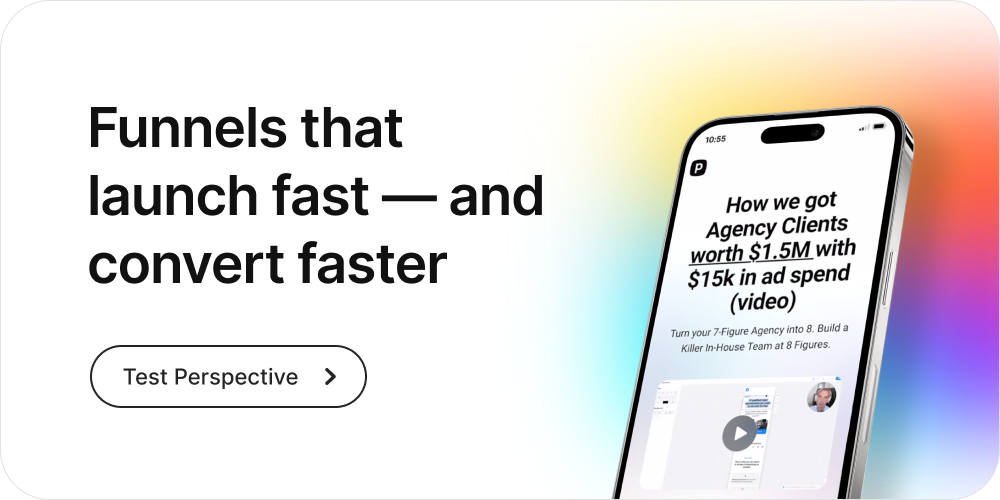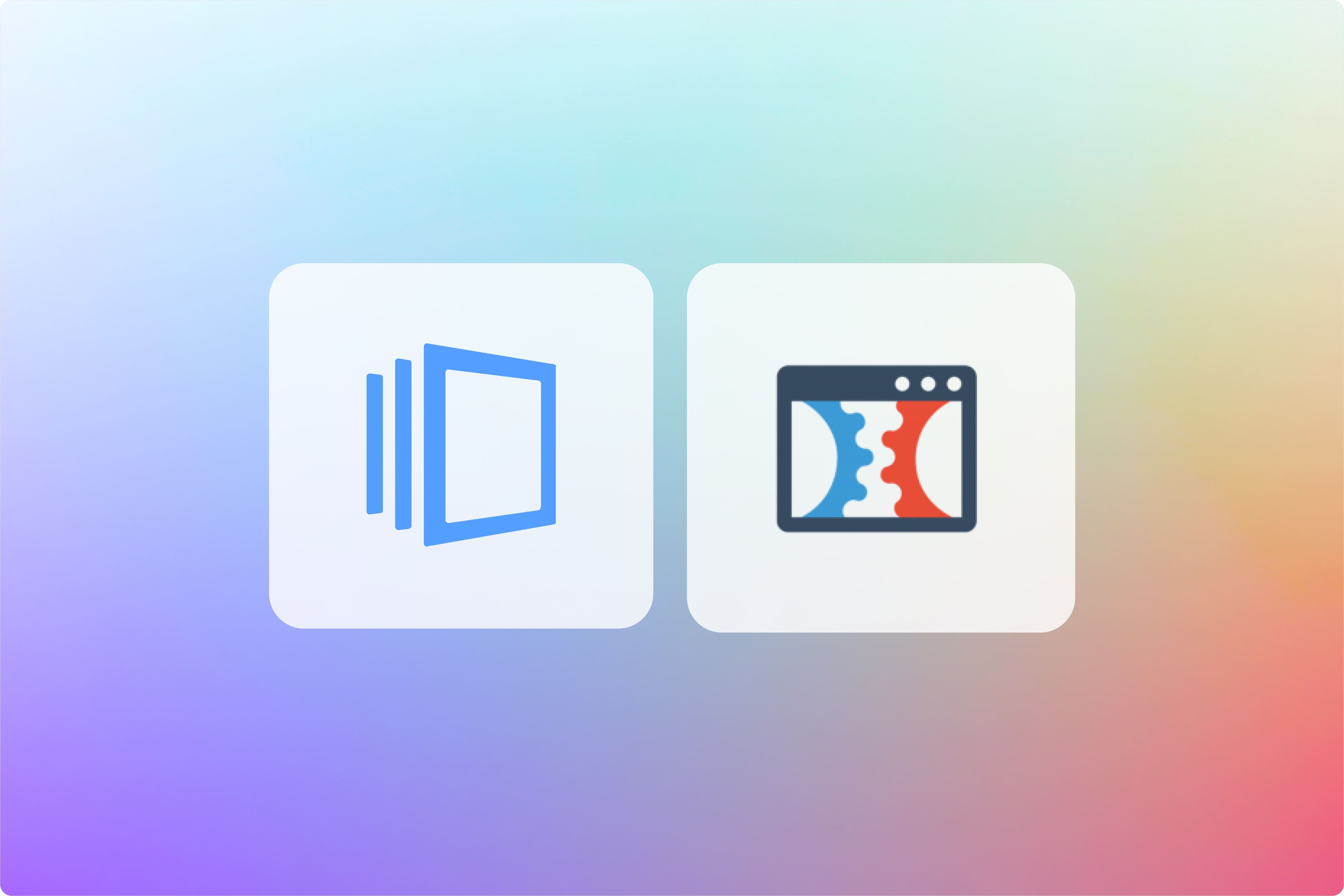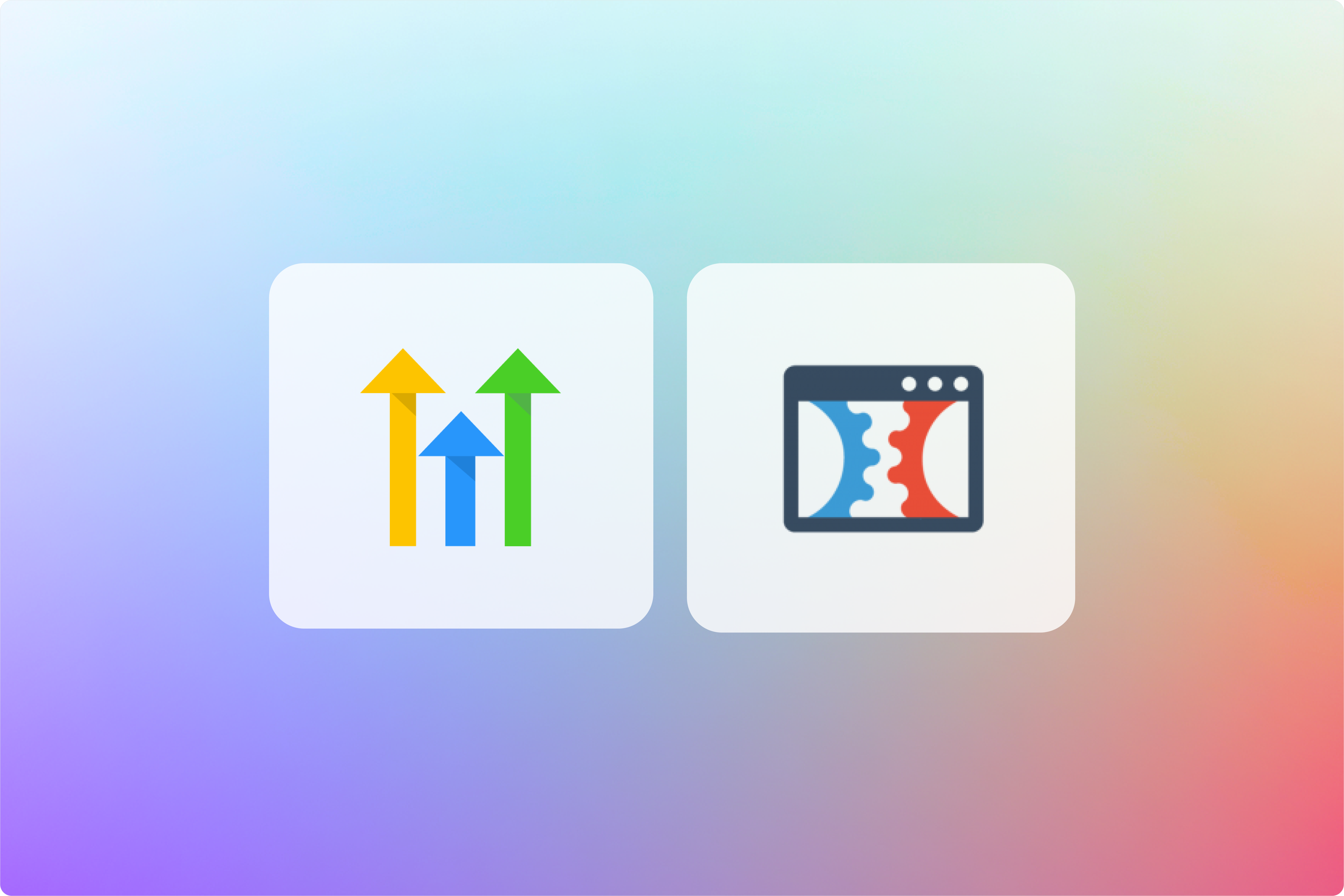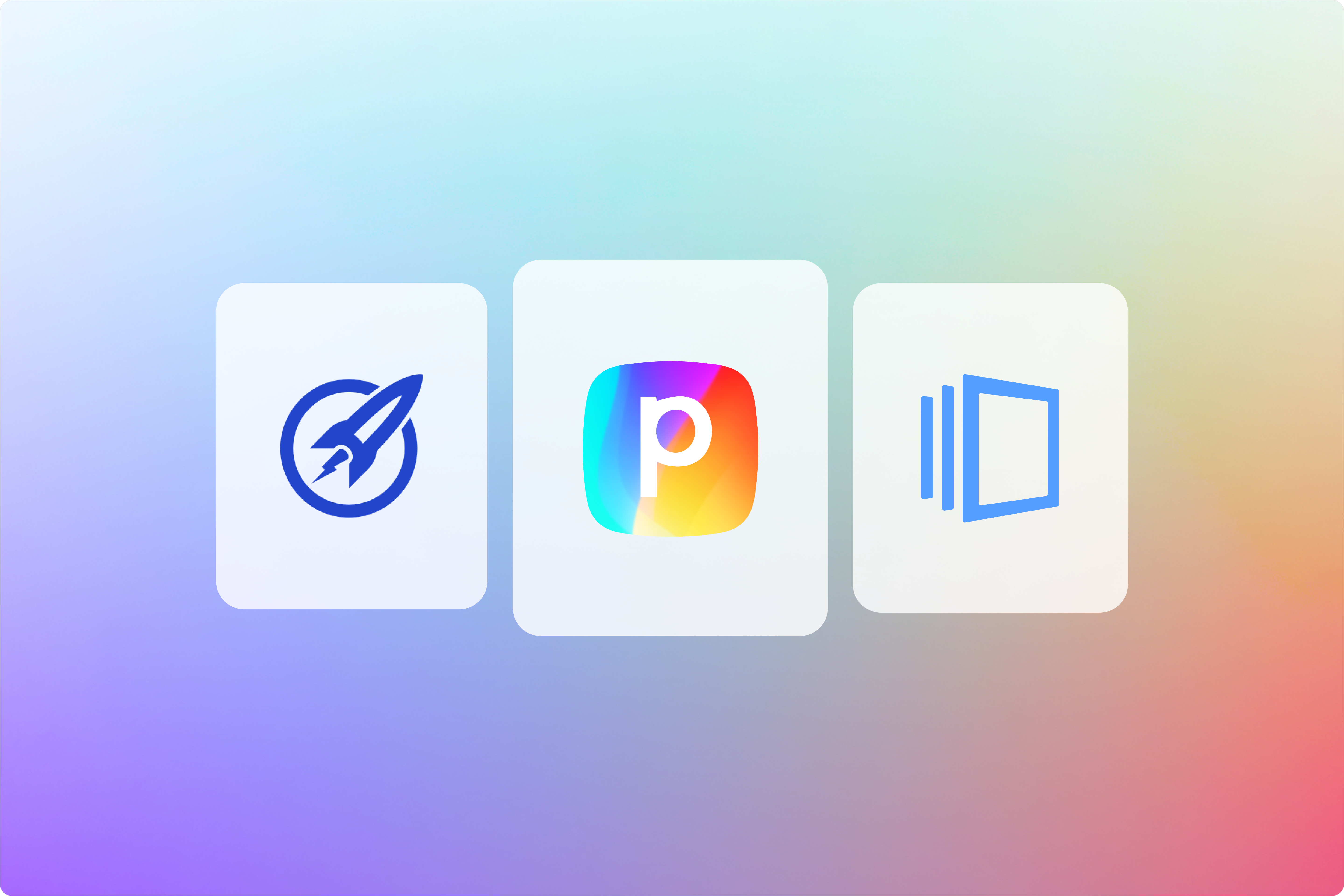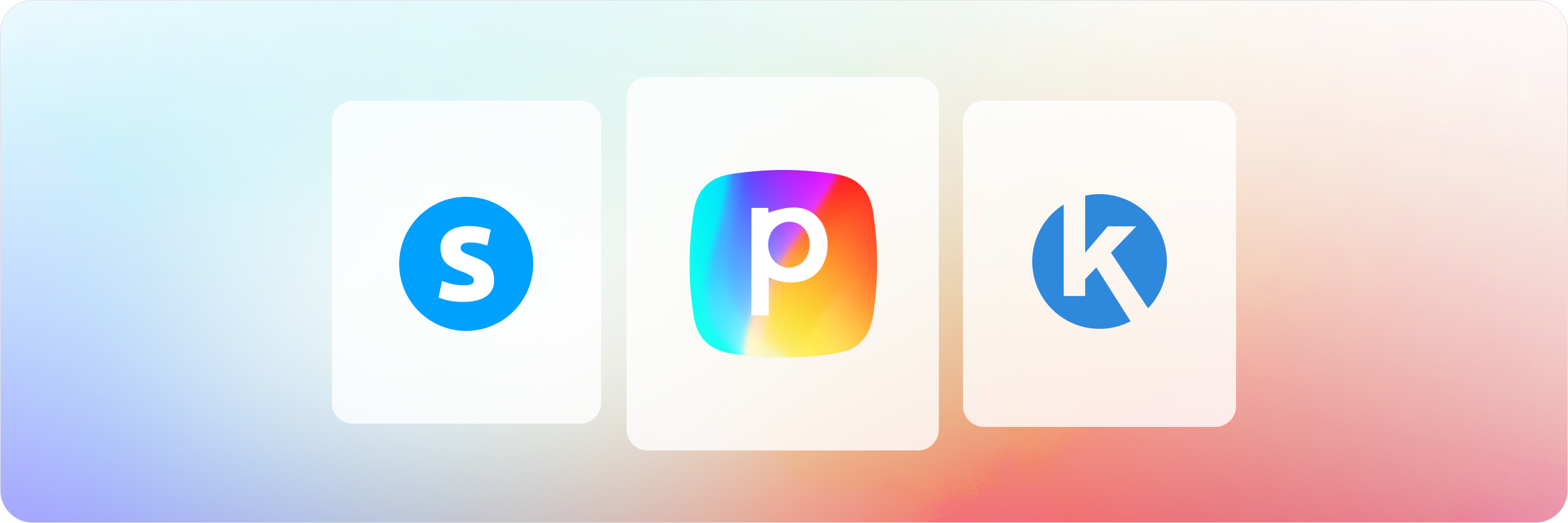
GoHighLevel is known as a popular all-in-one marketing platform for small businesses and agencies. But many eventually ask: is there a GoHighLevel alternative that’s a better fit?
When costs climb, complexity slows teams down, or features fall short, marketers look for a GoHighLevel alternative that complements their business.
In this guide, we’ll compare the top GoHighLevel competitors so you can identify the right solution for you. Let’s explore the alternatives to GoHighLevel 👇
GoHighLevel alternative overview
This quick GoHighLevel alternatives comparison breaks down the key players:
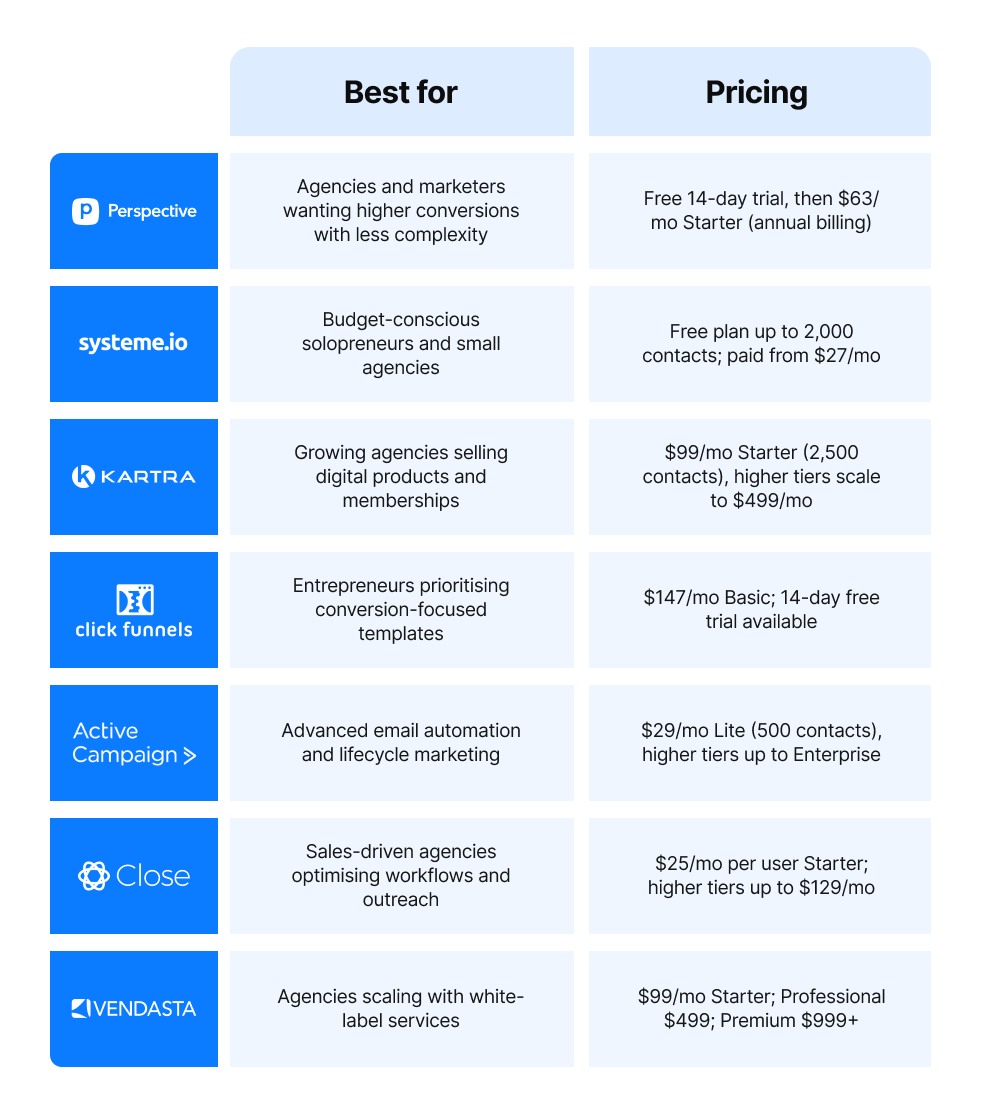
Perspective lets you build and launch mobile-first funnels fast, with CRM and messaging included, so you convert more 👉 Start your 14-day free trial, try Perspective today
GoHighLevel explained
GoHighLevel is positioned as an all-in-one “agency operating system”. Instead of juggling a CRM, funnel builder, email tool, and scheduling app separately, it combines them into a single platform. Agencies use it to capture leads, automate follow-ups, book appointments, and manage online reviews.
Its features include:
- Pipeline CRM to manage contacts and track deals across stages.
- Landing page and funnel builder with a drag-and-drop editor.
- Automated messaging via email, SMS, and voicemail drops.
- Calendar booking tools with reminders and confirmations.
- Reputation management to request and display reviews.
- White-label options so agencies can offer a branded client portal.
The appeal is clear: everything talks to each other. A new lead captured through a landing page can instantly hit the CRM, trigger automation, and appear inside client reporting without relying on integrations.
The trade-off is that the funnel templates and automation don’t go especially deep. They cover a wide range of functions, but without the refinement you’d expect from tools built for a single purpose.
Think of it like a Swiss army knife: practical and versatile, but rarely the very best tool for any single job. That’s why many agencies eventually explore GoHighLevel alternatives that dig deeper into their most important workflows. This guide is built to highlight those options.
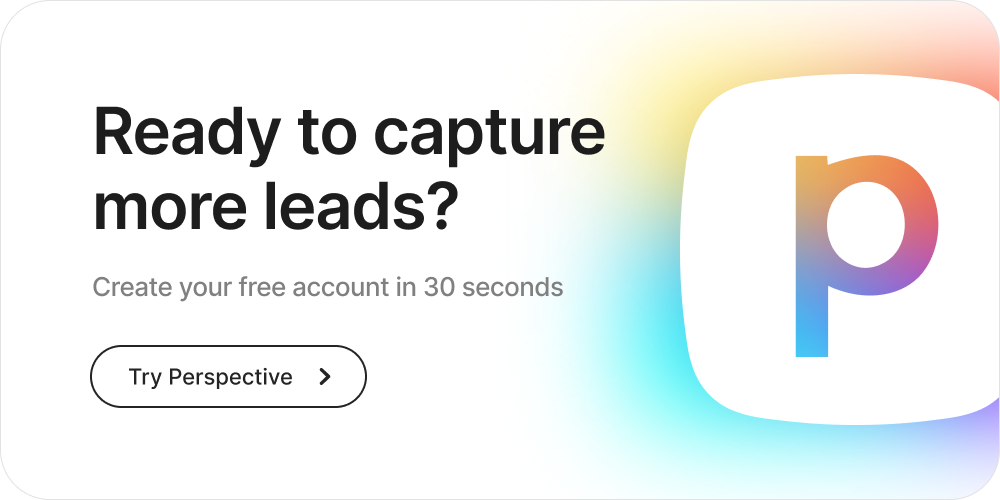
The 7 best GoHighLevel alternatives
1. Perspective Funnels
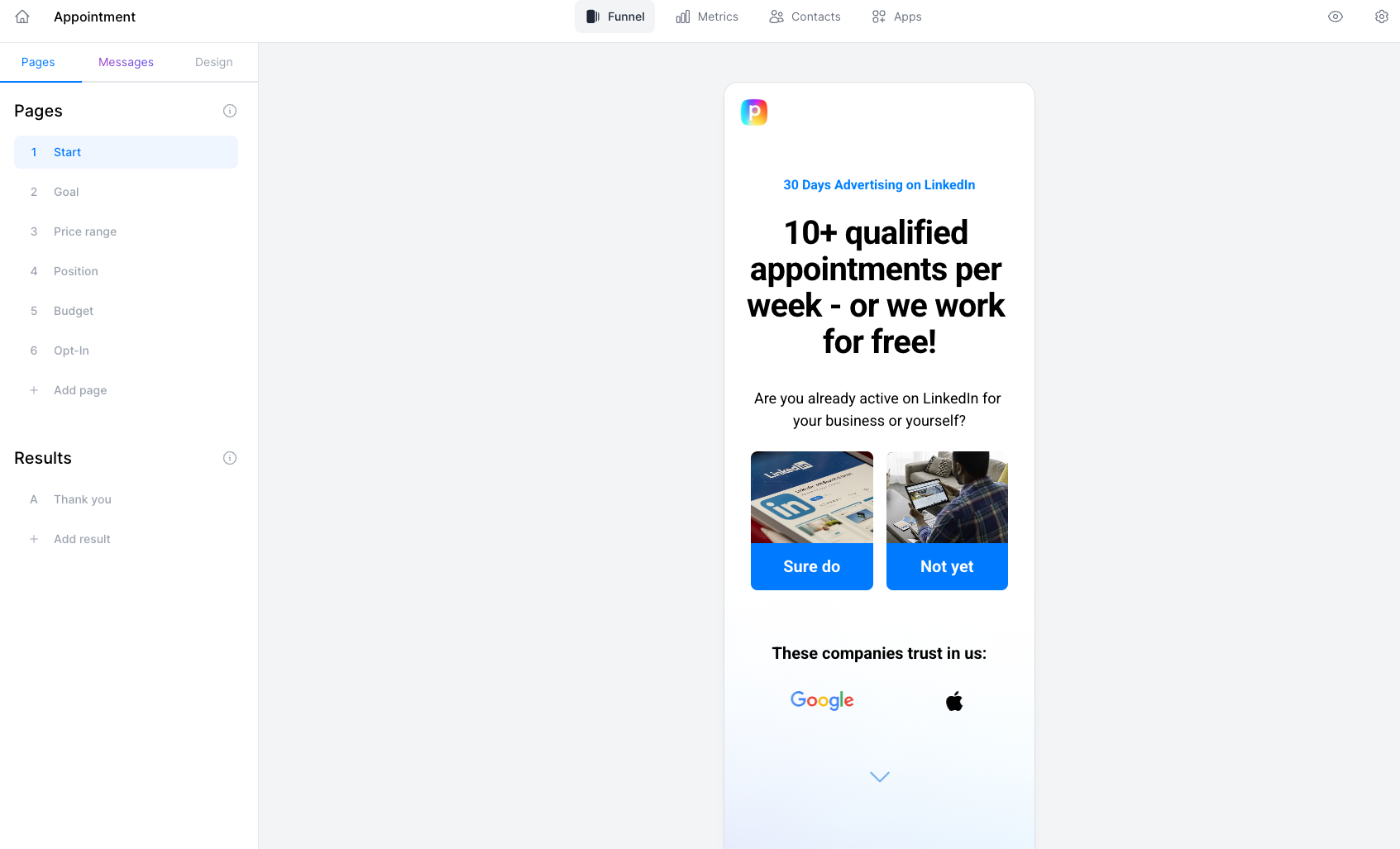
Best for agencies and marketers that want higher conversions without complexity.
Perspective is the strongest overall alternative to GoHighLevel. It combines fast setup, simple campaign management, a capable CRM, native email and messaging, and built-in analytics into one package that’s easier to use and more cost-effective than all-in-one suites.
And because it was designed natively for mobile, funnels load in under three seconds, ad traffic converts at a higher rate, and teams see stronger ROAS. The mobile foundation is a clear edge — but it’s only part of why Perspective outperforms.
Use case example: Performance marketing agencies use Perspective to launch funnels that consistently outperform generic landing pages or instant forms. Instead of pushing traffic to slow websites, they spin up swipe-friendly funnels that capture more intent, qualify leads with quizzes, and deliver higher-quality conversions.
Key features:
- Build funnels in 30 minutes with a drag-and-drop editor.
- Lightning-fast speeds, funnels load in under 3 seconds.
- Built-in CRM with lead statuses, notes, and profiles.
- Native email and messaging for automated follow-up.
- Personalisation at scale with dynamic fields like names, paths, and offers.
- Built-in analytics to track conversions without extra tools.
Pricing:
Perspective offers a transparent, license-based pricing model with no hidden fees. Agencies can create unlimited funnels within their package and scale with sub-accounts as needed. Unlike GoHighLevel’s credit-based pricing, which often hides extra costs through add-ons or usage caps, Perspective keeps costs predictable.
Annual plans start at $63 per month (Start plan), with higher tiers at $196 per month (Grow) and $396 per month (Expand). The Scale plan offers custom pricing for fast-growing enterprises. All paid tiers include a 14-day free trial.
Perspective vs GoHighLevel: who to choose?
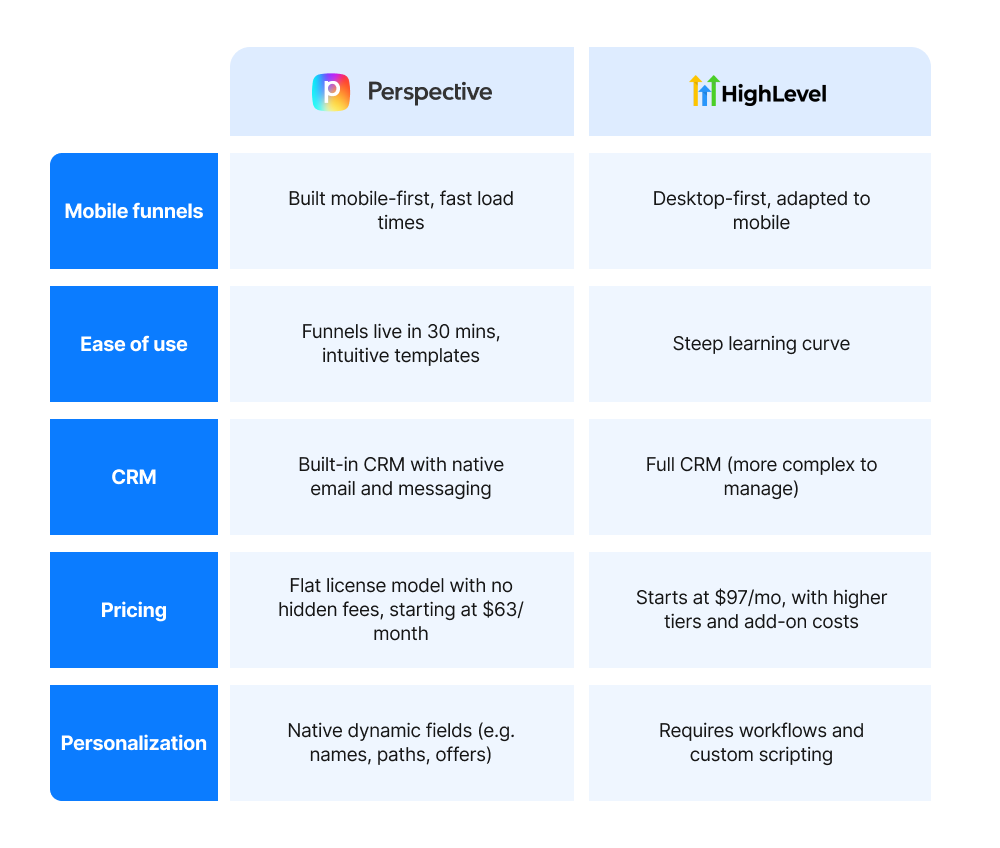
Perspective is best if you need to launch fast, mobile-ready funnels that scale. All without the bloat or add-on costs of GoHighLevel.

2. Systeme.io
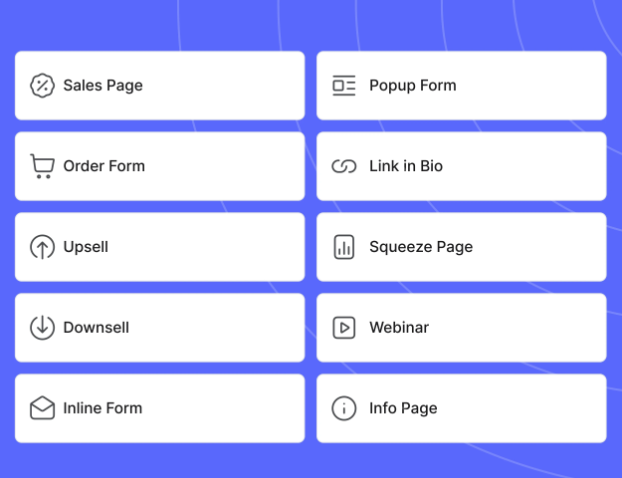
Best for budget-conscious small agencies.
Systeme.io is an all-in-one tool that combines funnels, email, courses, memberships, and basic automations in a simple interface. It suits small agencies and solopreneurs that value low cost and fast setup over depth of customization.
As a GoHighLevel alternative, its main differentiator is price and simplicity. Users get an integrated stack without managing multiple tools, though template depth, integrations, and scalability are more limited than higher-end platforms. For lean teams, it reduces operational overhead; growing teams will hit the feature ceiling sooner.
Use case example: A small agency on a tight budget can use Systeme.io to build basic funnels, send automated emails, and deliver memberships from a single dashboard. The appeal is low cost and simplicity, though the trade-off is less depth and flexibility compared with more advanced platforms.
Key features:
- Free plan for up to 2,000 contacts.
- Sales funnels, email automation, memberships, and affiliate tools.
- Drag-and-drop editor for quick campaigns.
- Basic analytics included.
Pricing:
Systeme.io offers a free plan that supports up to 2,000 contacts with unlimited emails and basic funnels. Paid tiers start at $27 per month for 5,000 contacts and custom domains. The mid-tier plan is $47 per month, increasing limits to 10,000 contacts and 50 funnels with features such as webinars and additional automation. At the top end, the $97 per month plan supports 15,000 contacts and removes most usage limits, while also providing priority support.
Reviews:


Source: G2
3. Kartra
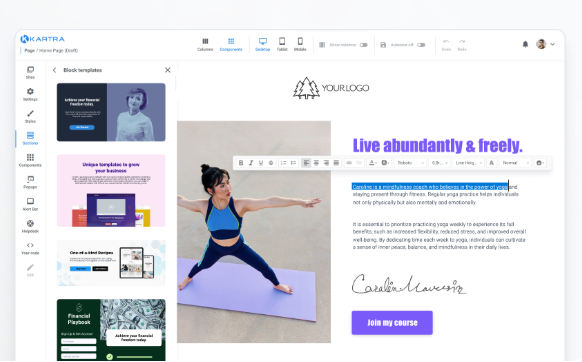
Best for agencies scaling digital product sales and memberships.
Kartra brings funnels, email, memberships, checkout, and video hosting into a single platform. It’s built to help digital businesses deliver and monetize content — with pre-made “Campaigns” that speed up launches and integrated tools for managing subscriptions, payments, and customer engagement.
As a GoHighLevel alternative, Kartra is most relevant when you need commerce and content delivery features built in. It goes beyond basic funnel creation by combining sales, content, and delivery in one ecosystem. The trade-off is a steeper learning curve and higher pricing compared with entry-level plans on other platforms.
Use case example: An agency supporting a fitness brand could use Kartra to host video workouts, manage recurring payments, deliver gated membership content, and automate upsells — all within one system. The limitation is a higher price point and more complexity compared with lighter tools.
Key features:
- Funnel simulation to preview customer journeys before launch.
- Drag-and-drop builder with templates.
- Advanced automation workflows.
- Built-in video hosting and membership site management.
Pricing:
Kartra’s entry-level plan starts at $99 per month for up to 2,500 leads, with the Silver plan at $199 per month scaling to 12,500 leads. Higher tiers like Gold ($299 per month) and Platinum ($499 per month) are aimed at larger operations. This makes Kartra one of the more expensive options in the category, especially for smaller teams.
Reviews:
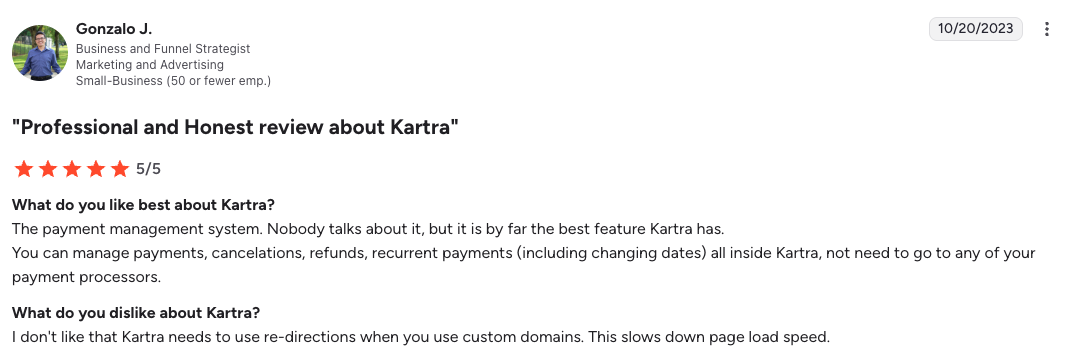
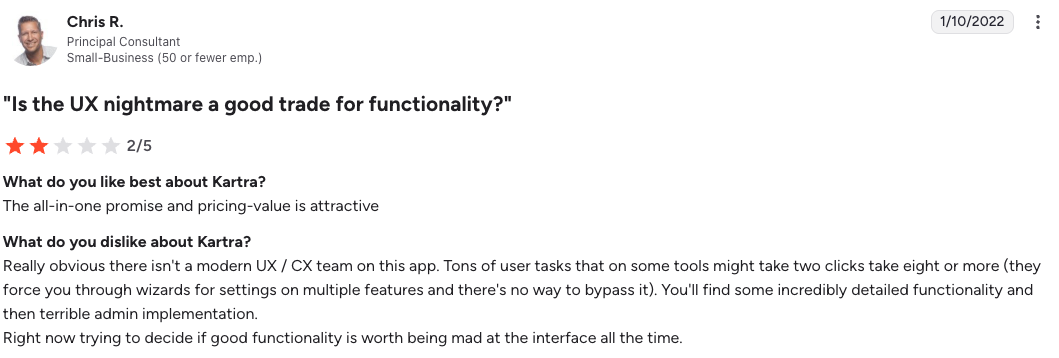
Source: G2
4. ClickFunnels
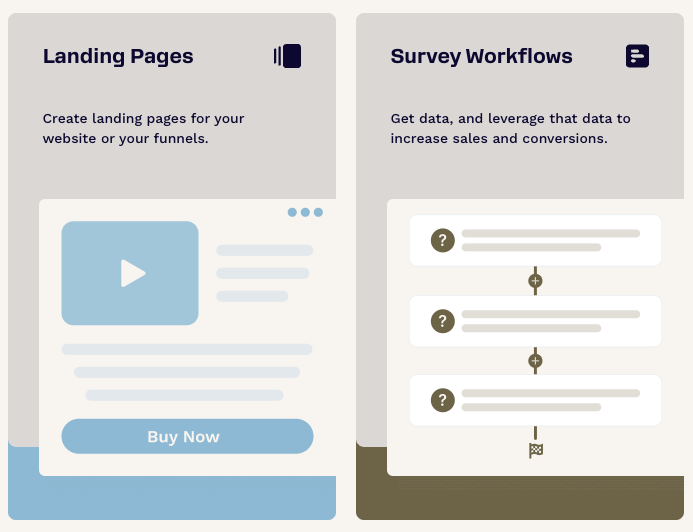
Best for agencies prioritizing proven funnel templates.
ClickFunnels is one of the most recognized funnel builders, known for its large library of conversion-tested templates, extensive training resources, and active community. It appeals to agencies and entrepreneurs who want to launch campaigns quickly without heavy technical setup.
With version 2.0, ClickFunnels has expanded beyond funnels to include blogs, memberships, and basic eCommerce. While it doesn’t offer the same depth of CRM or client management as GoHighLevel, its main draw remains the templates and community rather than long-term scalability or performance optimisation.
Use case example: A marketing agency running an online course launch could use ClickFunnels’ templates to test multiple variations, track results, and scale quickly. The trade-off is reliance on a template-driven approach that works well for quick launches but can limit flexibility and scalability as campaigns grow more complex.
Key features:
- Pre-built templates for fast funnel launches.
- ClickFunnels 2.0 adds blogs, memberships, and eCommerce.
- Strong community and training ecosystem.
Pricing:
ClickFunnels offers three main pricing tiers: $147 Basic, $197 Pro, and $497 Funnel Hacker, with a free 14-day trial included. Despite the higher entry cost, it wasn’t designed with mobile performance as a priority — an area where Perspective excels.
Reviews:


Source: G2
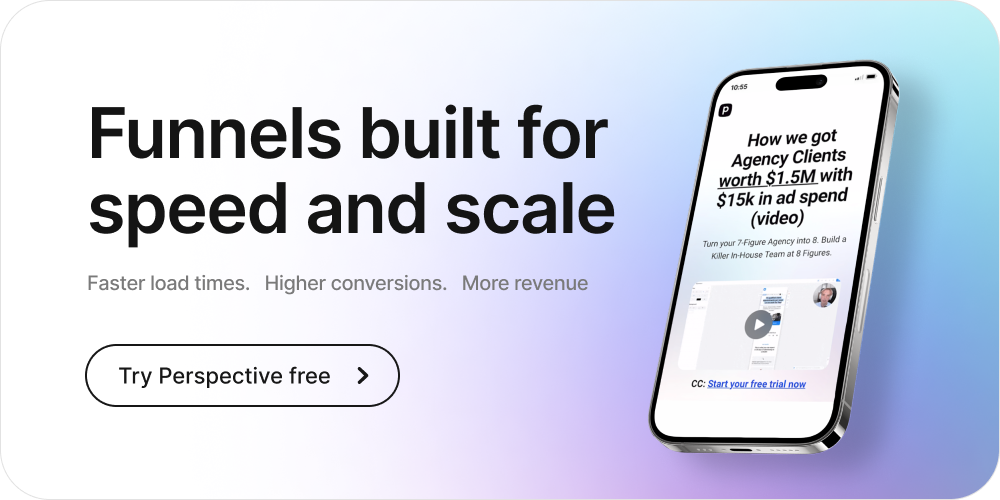
5. ActiveCampaign

Best for agencies and businesses with complex email journeys.
ActiveCampaign is a well-established email marketing and automation tool, used by businesses that need deeper segmentation and personalisation than most all-in-one platforms provide. Its strength lies in advanced workflows, behavioural triggers, and deliverability — but it doesn’t cover the full marketing stack.
As a GoHighLevel alternative, ActiveCampaign is relevant if email is the priority, but it won’t replace a funnel builder or CRM. That means agencies often end up running it alongside other platforms.
Use case example: An eCommerce brand struggling with cart abandonment could use ActiveCampaign to build behaviour-based flows — sending reminders, discounts, and product recommendations at the right time. While this works well for email, it still requires another tool to handle funnels and capture leads in the first place.
Key features:
- Behavioural triggers and branching workflows.
- Predictive sending and personalised content recommendations.
- E-commerce integrations for cart recovery and product suggestions.
Pricing:
ActiveCampaign starts with a Lite plan at $29/month for 500 contacts. The Plus plan at $49/month and the Pro plan at $149/month add features like SMS marketing, lead scoring, and advanced automations. Enterprise pricing is available on request for larger teams.
Reviews:


Source: G2
6. Close CRM
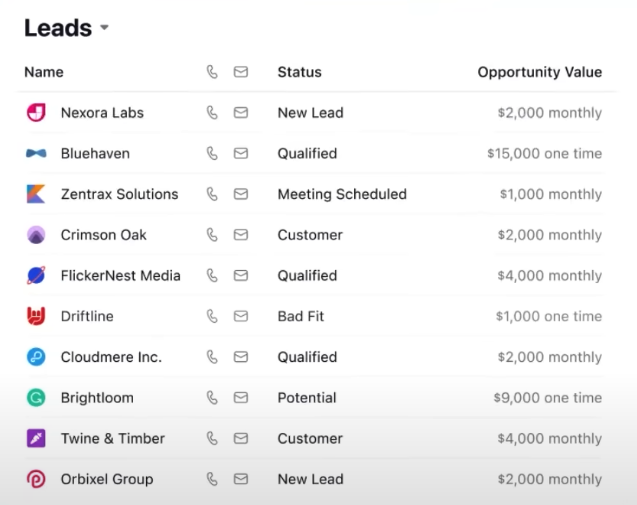
Best for sales-driven teams that need a focused pipeline tool.
Close CRM is designed to help sales teams manage pipelines, calls, and follow-ups in one place. Unlike GoHighLevel, which spreads CRM functionality across a broader marketing suite, Close focuses on sales productivity with built-in calling, email sequences, and pipeline automation.
As a GoHighLevel alternative, Close is relevant if your bottleneck is sales execution rather than marketing automation. It concentrates on sales activity but does not include funnel building, so you’ll need a separate platform to capture and convert leads.
Key features:
- Built-in calling, email, and SMS tracking.
- Automated reminders and pipeline workflows.
- Searchable conversation history across channels.
- Reporting dashboards for team and pipeline performance.
Pricing:
Close pricing is billed annually at $35 per user per month for Essentials, $99 for Growth, and $139 for Scale. Higher tiers add features like automation, advanced reporting, and controls for scaling teams. Unlike license-based tools, pricing scales with team size, which can add up quickly for larger agencies.
Reviews:

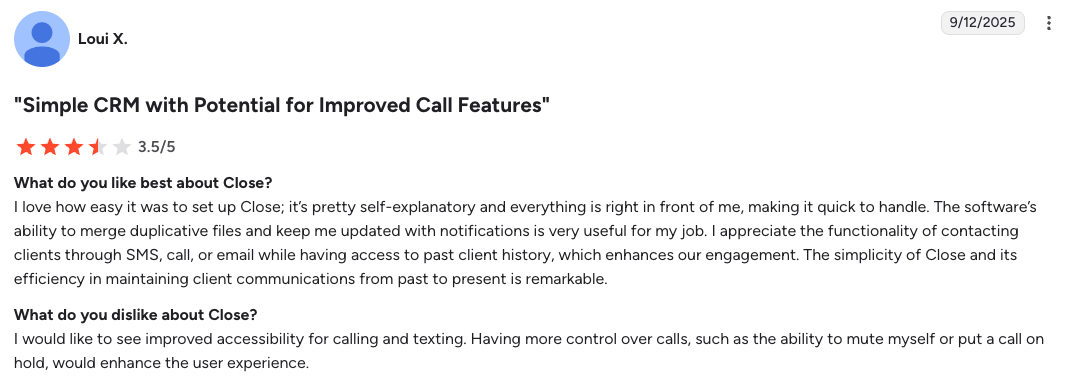
Source: G2
{{cta}}
7. Vendasta
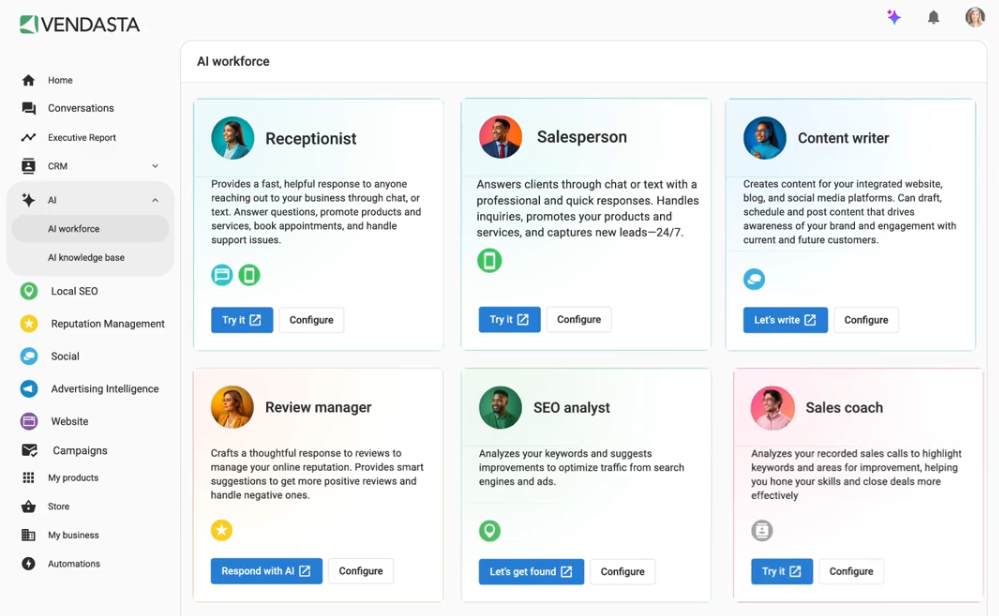
Best for agencies reselling ready-made digital services.
Vendasta gives agencies access to a marketplace of white-label services such as websites, SEO, social media, and reviews. These can be packaged and sold under the agency’s own brand, with delivery handled through Vendasta’s client portal that includes quoting, billing, and fulfilment tools.
As a GoHighLevel alternative, Vendasta works for agencies that want to expand their service offering quickly without hiring in-house specialists. Vendasta doesn’t include funnel building or marketing automation — it’s focused on reselling services. Agencies also pay both a subscription fee and extra costs on each service they resell, which can reduce overall profitability.
Use case example: A small agency that wants to add SEO and reputation management could use Vendasta’s services to deliver them under its own brand. This allows for faster speed to market, but it ties the agency to Vendasta’s pricing and fulfilment model rather than keeping delivery in-house.
Key features:
- Marketplace of digital services.
- White-label client portals.
- Sales intelligence for upsell opportunities.
Pricing:
Vendasta’s starter plan begins at $99 per month, with professional at $499 and premium at $999. Enterprise pricing is available on request. On top of the subscription, agencies also pay a margin on each service they resell, which makes it one of the more costly options in this space.
Reviews:

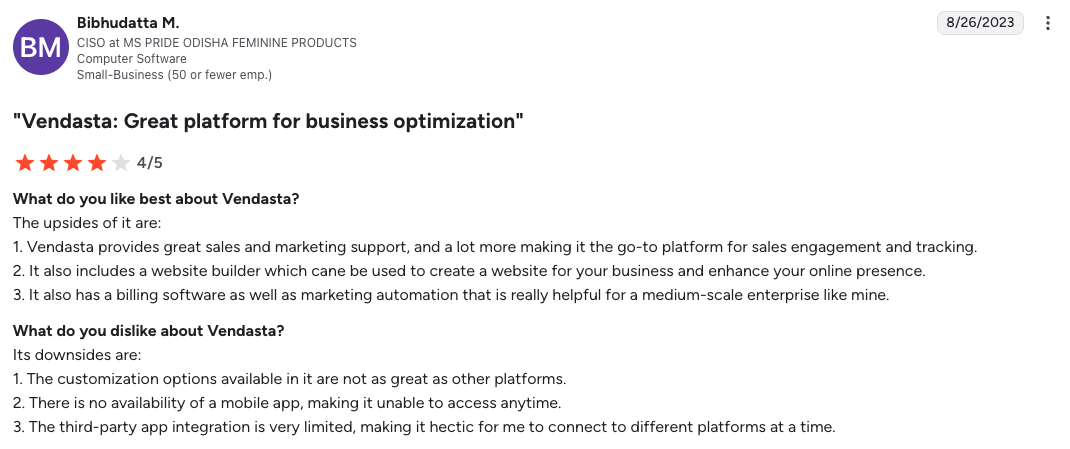
Source: G2
FAQs: GoHighLevel alternatives
What’s better than GoHighLevel?
Perspective is a stronger platform than GoHighLevel. Unlike GoHighLevel, which wasn’t built mobile-first, Perspective Funnels is designed from the ground up for performance on mobile. Pages load in under three seconds, which directly improves conversion rates.
On top of that, Perspective includes native email and messaging and offers a competitive edge on price. If you care about speed, conversions, and ease of use, Perspective is the top choice.
Which is better, GoHighLevel or ClickFunnels?
GoHighLevel and ClickFunnels serve slightly different audiences, so the answer depends on what you’re optimising for.
ClickFunnels is popular with entrepreneurs and small businesses because of its ready-made funnel templates and strong community. But while it makes it easy to get started, many users find the templates limiting and the platform expensive once you need to scale.
GoHighLevel, meanwhile, markets itself as an all-in-one solution for agencies with CRM, automation, funnels, SMS/email, and more. The issue is that its broad scope can feel overwhelming, and usability often suffers compared to more focused tools.
The fundamental limitation?
Neither platform was built mobile-first. While both adapted desktop experiences for mobile, they don’t match the speed and optimisation needed for today’s ad-driven traffic. This is where Perspective Funnels has the edge — you can build a high-converting funnel in 30 minutes, natively optimised for mobile. Perspective combines mobile-first funnels with a lightweight CRM, native email and messaging, and transparent pricing that starts below both ClickFunnels and GoHighLevel 👉 Start your 14-day free trial
What does GoHighLevel replace?
GoHighLevel positions itself as a replacement for an entire marketing stack. Its pitch is simple: instead of juggling multiple subscriptions, you can manage funnels, CRM, automations, scheduling, messaging, and even reputation management all inside one platform. But the trade-off is depth. GoHighLevel does many things well enough, but rarely best-in-class.
For example, its page builder was built desktop-first and adapted for mobile, which often underperforms in today’s ad-driven landscape. That’s why agencies spending heavily on paid social often turn to Perspective Funnels, the mobile-first alternative designed to maximise conversions where it matters most: on phones.
Is there a free version of GoHighLevel?
GoHighLevel doesn’t offer a free plan. Pricing starts at $97 per month for the basic package and scales quickly to $297 or $497 as you add accounts and features. For smaller agencies, that pricing can be restrictive, especially if they only use a fraction of what’s included.
Some competitors, like Systeme.io, offer a free plan. However, the limits make it impractical once you start running real campaigns.
This is where Perspective Funnels stands out. While there’s no permanently free tier, you can start with a free trial, launch a funnel in under 30 minutes, and test it with real traffic. And unlike most competitors, Perspective’s paid plans start lower, giving you a genuine pricing edge without sacrificing features like native email and messaging.
What are the best alternatives to GoHighLevel?
There are plenty of tools positioned as GoHighLevel alternatives, but Perspective stands out as the best.
Systeme.io appeals to solopreneurs with its free plan, but the limits make it impractical once you start running real campaigns. ClickFunnels remains popular for its ready-made templates and large community, but it lacks the speed, flexibility, and pricing advantage of newer platforms.
Perspective is built mobile-first, it delivers sub-three-second load times that boost conversion rates on ad traffic. It also includes native email and messaging. With the Start plan priced lower than both GoHighLevel and ClickFunnels, Perspective offers a clear edge in both cost and performance. For agencies and businesses that care about fast, effective funnels, Perspective is the best alternative to GoHighLevel.
The GoHighLevel alternative built for higher conversions
If you’re looking for a GoHighLevel alternative that gives you:
✔️ Funnels built in 30 minutes with drag-and-drop simplicity.
✔️ Mobile-first design that loads in under 3 seconds.
✔️ Better ROAS from ads driving to mobile-optimised pages.
✔️ Built-in CRM, native email and messaging, plus analytics — without the heavy overhead.
✔️ Personalisation at scale so every lead feels unique.
✔️ More affordable entry-level pricing than GoHighLevel or ClickFunnels.
Then, Perspective is clearly the best alternative to GoHighLevel. Try Perspective today 👇
